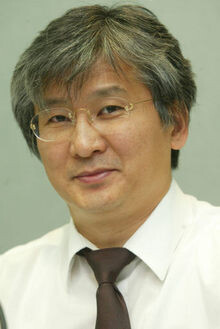hankyoreh
Links to other country sites 다른 나라 사이트 링크
Prosecution evading debate over National Security Law

The prosecution rejected a chief justice’s suggestion of debate between witnesses in a case regarding the National Security Law. The Seoul Central District Court on April 23 asked lawyers for both the prosecution and the defense to summon witnesses to prove whether Yun Gi-jin, the chairman of the South Korean branch of a South-North youth organization, violated the National Security Law.
Yun was arrested on February 27, nine years after being sought by the authorities for sending a leader of Hanchongyeon, a umbrella organization of university student unions, to the North to take part in a celebration organized for South-North youth organizations that took place in Pyongyang in 1999. He was also charged with violating the National Security Law by producing and possessing pro-communist materials.
The National Security Law was enacted in 1948 and made communism and recognition of North Korea illegal. The law also restricts distribution of anti-government materials and forbids people from joining organizations that could be a threat to the state. Though the law has lost its strength in recent years, it still, some say, serves to limit civil rights and freedom of speech.
“As the defendant does not agree with the written statement submitted by the prosecution, we requested that the two sides summon witnesses to clarify the truth of the case in court,” one of the district court justices said. The prosecution had submitted to the court several written statements from conservative professors that made reference to the materials produced and possessed by Yun. In a statement from Je Seong-ho of Chung-Ang University, Je claimed that Yun’s materials supported the North’s “military-first politics,” making him a national security threat.
Defense lawyers proceeded to summon witnesses, including Professor Kim Min-ung from Sungkonghoe University, but the prosecution did not, saying that the statement they had submitted was sufficient. The justice had planned to let witnesses from both sides testify during the fourth trial on May 26, but on the day of the trial, Prof. Kim said, “As inter-Korean relations are moving toward co-existence, there are no hostilities, and, in consequence, we can say that the idea of ‘property that benefits the enemy’ no longer exists.”
In connection with the prosecution’s attitude, Seol Chang-il, a lawyer for the defense, remarked, “The judge suggested a debate among the scholars who were serving as witnesses for both sides and I don’t understand why the prosecution is evading this without a clear reason.”
In response, Guk Min-su, an official of the Seoul Central District Prosecutors’ Office, refuted the idea that the prosecution had already submitted all of its evidence and did not find it necessary to summon additional witnesses.
Please direct questions or comments to [englishhani@hani.co.kr]
Editorial・opinion
![[Column] Season 2 of special prosecutor probe may be coming to Korea soon [Column] Season 2 of special prosecutor probe may be coming to Korea soon](https://flexible.img.hani.co.kr/flexible/normal/500/300/imgdb/original/2024/0426/3317141030699447.jpg) [Column] Season 2 of special prosecutor probe may be coming to Korea soon
[Column] Season 2 of special prosecutor probe may be coming to Korea soon![[Column] Park Geun-hye déjà vu in Yoon Suk-yeol [Column] Park Geun-hye déjà vu in Yoon Suk-yeol](https://flexible.img.hani.co.kr/flexible/normal/500/300/imgdb/original/2024/0424/651713945113788.jpg) [Column] Park Geun-hye déjà vu in Yoon Suk-yeol
[Column] Park Geun-hye déjà vu in Yoon Suk-yeol- [Editorial] New weight of N. Korea’s nuclear threats makes dialogue all the more urgent
- [Guest essay] The real reason Korea’s new right wants to dub Rhee a founding father
- [Column] ‘Choson’: Is it time we start referring to N. Korea in its own terms?
- [Editorial] Japan’s rewriting of history with Korea has gone too far
- [Column] The president’s questionable capacity for dialogue
- [Column] Are chaebol firms just pizza pies for families to divvy up as they please?
- [Column] Has Korea, too, crossed the Rubicon on China?
- [Correspondent’s column] In Japan’s alliance with US, echoes of its past alliances with UK
Most viewed articles
- 1‘We must say no’: Seoul defense chief on Korean, USFK involvement in hypothetical Taiwan crisis
- 2N. Korean delegation’s trip to Iran shows how Pyongyang is leveraging ties with Moscow
- 3‘Weddingflation’ breaks the bank for Korean couples-to-be
- 4[Column] Park Geun-hye déjà vu in Yoon Suk-yeol
- 5Korea sees more deaths than births for 52nd consecutive month in February
- 6[Guest essay] The real reason Korea’s new right wants to dub Rhee a founding father
- 7[Column] The clock is ticking for Korea’s first lady
- 8[Column] Has Korea, too, crossed the Rubicon on China?
- 9Why Korea shouldn’t welcome Japan’s newly beefed up defense cooperation with US
- 10Will NewJeans end up collateral damage in internal feud at K-pop juggernaut Hybe?